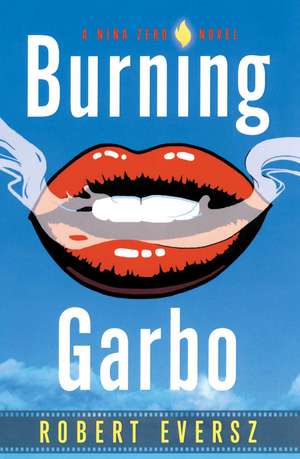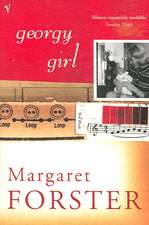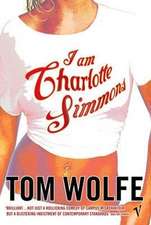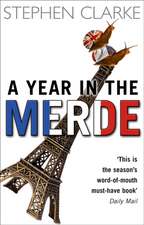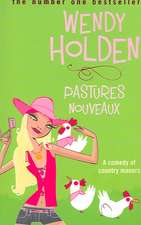Burning Garbo: A Nina Zero Novel
Autor Robert Everszen Limba Engleză Paperback – 16 feb 2005
Accompanied by the toothless Rott, Zero goes on the hunt, compelled to prove that someone else set fire to the star's estate to keep the cops from jailing her for arson and -- when charred bones are discovered in the ashes -- murder. The killers are equally interested in finding her, and their desperation escalates to a bone-chilling series of violent encounters in which Nina plays hunter one moment and prey the next.
Preț: 109.95 lei
Nou
Puncte Express: 165
Preț estimativ în valută:
21.04€ • 21.88$ • 17.61£
21.04€ • 21.88$ • 17.61£
Carte disponibilă
Livrare economică 21 februarie-07 martie
Preluare comenzi: 021 569.72.76
Specificații
ISBN-13: 9780743250146
ISBN-10: 0743250141
Pagini: 288
Dimensiuni: 140 x 216 x 20 mm
Greutate: 0.31 kg
Ediția:Reprint
Editura: Simon&Schuster
Colecția Simon & Schuster
ISBN-10: 0743250141
Pagini: 288
Dimensiuni: 140 x 216 x 20 mm
Greutate: 0.31 kg
Ediția:Reprint
Editura: Simon&Schuster
Colecția Simon & Schuster
Notă biografică
Robert Eversz is the author of the Nina Zero series of crime novels, which have been translated into ten languages. He lives, at various times, in Los Angeles, Prague, and St. Pol de Mar, on the coast of Spain. More information about him can be found online at www.ninazero.com.
Extras
Chapter One
On the morning of my thirtieth birthday I scaled the hills above the Malibu estate of a movie star who hadn't been seen in public for the last decade. I hiked in jeans and a T-shirt, my camera equipment packed into a bag on my back. The late-October sun burned over my shoulder and the resinous perfume of coastal sage plumed into the air as I kicked through the brush. I had been trying to get a tabloid-worthy photograph of Angela Doubleday for three days, commissioned by the editor of Scandal Times to coincide with the tenth anniversary of the death of a stalker killed in her arms.
Midway up the hill I paused to plot a course to an outcrop of rock above the estate. The rock, worn sandstone jutting from the chaparral, would serve as the paparazza's equivalent of a duck blind, concealing me while I waited out the shot. Doubleday was not an easy woman to photograph. Years of self-imposed exile had honed her skills at seclusion. She may have left the house once during the three days I tracked her, ferried to Beverly Hills in the back of a stretch Cadillac driven by a liveried chauffeur. The passenger windows were smoked and the limousine cruised the streets of Beverly Hills without once pulling to the curb. The chauffeur could have been transporting a flock of parrots and I wouldn't have known the difference.
I hiked to the rock briskly enough to work up a sweat, aware that I'd be sitting for the remainder of the afternoon. Celebrity stakeouts demand hours of idleness and solitude, valuable job skills I acquired at California Institute for Women. I've learned to take my exercise when I can. I unpacked the Nikon and glanced through the viewfinder. Cypress trees had been grown at the back of the estate to screen the pool and house from the view of jackrabbits, coyotes, lost hikers, and the occasional enterprising paparazza with a telephoto lens. I crouched beside the rock and attached the longest lens I owned, a five-hundred-millimeter beast the size of a rhinoceros horn. The cypress trees spired yellow-brown against the blue horizon, struck by a drought or blight that had stripped the needles near the trunk. I lined up my shot through a gap in the branches, focusing on a set of French doors that opened to the pool. I waited, a dry Santa Ana wind whipping at the tendrils of my hair. Though I sometimes had moral qualms about shooting people who didn't want to be shot, I was happy in my work. Six months earlier, the California Department of Corrections had paroled me four years into a seven-year fall for manslaughter. Nobody in my family spoke to me. I had associates, but no one I'd call up just to say hello. I was good at my job, and in the absence of any sustaining human relationships, that was good enough.
I pulled from my camera bag the Leonard Maltin biography of the woman I'd been hired to shoot and passed the time reading, my eye routinely flicking up to glance through the lens. Angela Doubleday made her first film appearance in a 1970s James Bond movie, playing a Las Vegas showgirl. The role was not coincidental. She had strutted the Vegas stage since the age of eighteen, wearing an elaborately stitched headdress of the Eiffel Tower and little else. A casting director noticed that her figure stuck out a little more here, tucked in a little more there. The two million men who bought the issue of Playboy featuring her that year noticed it, too. In the early 1960s, she might have been molded into a Marilyn Monroe-style sex icon, but by the '70s women whose figures seemed pumped by an air hose were looked up to only in automobile garages, truck stops, and other shrines to the pneumatic female. She was young enough to pattern herself with the changing times and did. She grew her hair long and straight, dispensed with bra and cosmetics, and rather than emulate the bleached-blond bimbos of the past, she portrayed a spaced-out hippie chick, which in retrospect was still a bimbo, just one redefined by the tastes of a different era.
An hour after I began my vigil an unfamiliar figure breached the French doors behind the pool. The man's zinc-colored hair marked him on the far side of fifty -- or so I thought until I focused on his face. It wasn't a bad-looking face, the lips full and the nose prominent, like the nose on the bust of a Roman senator, but the skin at his cheekbones pulled with the tautness of youth, and a single, manly crease marked his brow. Save for that crease, his face looked as smooth as a swept sidewalk. That alone was not proof of anything, not since L.A.'s seekers of eternal youth discovered Botox, a neurotoxin that when injected into the face paralyzes the muscles and as a side effect erases nearly every wrinkle from the skin. You can't accurately judge anyone's age in L.A. anymore, not from the neck up, not unless you put a gun to their head, tell them to wrinkle their brow. Those on Botox can't.
I dipped the lens to check out his moccasin-style loafers, Gap khakis, and striped polo. He glanced over his shoulder, perhaps at somebody in the house, then stared intently up the hill. I fought the impulse to duck behind the brush. The point of his gaze struck above me, near the crest. I'd staked out enough celebrities to know that movement attracts the eye. I knew enough to sit perfectly still, except for the twitch of my finger on the shutter release. Maybe I was looking at Doubleday's lover. Maybe he was the pool man. Maybe he'd turn out to be both. Only the collective imagination of Scandal Times would know for sure. The reflection of the pool in the glass shimmered when he slammed the French doors. I waited a few minutes for him to return. He didn't. I propped the Maltin biography on my knee and turned to the next chapter.
Had Angela Doubleday continued to play a spaced-out hippie she would have finished in a one-bedroom apartment far from the studios and not on a two-acre estate in Malibu. The defining moment in her career came when the director Sidney Lumet cast her in the role of Anna, the voracious young wife in Eugene O'Neill's Desire Under the Elms. Doubleday played Anna like a cornered lioness. The Academy of Motion Picture Arts and Sciences likes nothing more than a surprise turn by one of its stars and gave her the nod for the first of four Academy Award nominations, the last for a low-budget independent production in which she portrayed an aging Las Vegas showgirl battling drug and alcohol addiction.
The stalker attacked on the night she celebrated her nomination. He broke through a security barrier outside Spago in Beverly Hills and slashed a guard with his penknife. The stalker had been following her for two months. Something glinted in his raised hand as he charged forward. Everybody swore it was the knife. An off-duty cop shot him. The stalker grabbed the bodice of Doubleday's dress as he fell. He weighed no more than 130 pounds and was mortally wounded but gripped her so fiercely they sprawled together to the ground. The bullet had clipped his aorta. He bled to death in seconds. When the guards peeled him away they found a doll in the hand where the knife should have been. The doll was dressed and painted to look like Angela Doubleday. In the note pinned to the doll's dress he wrote that he intended to give it to her.
I put my eye to the viewfinder again and panned from the house to the sea, where the stiff offshore breeze whipped a flotilla of catamarans and windsurfers beyond the wave break. For a moment the real world vanished. Only the image existed, bright and beautifully distant, the four corners of the viewfinder framing the world into a coherency I found lacking to the naked eye. A crack of brush behind me pulled my face from the camera. A man crashed through the chaparral on the opposite side of the rock, charging down the hill at such speed that when he glimpsed me in passing and tried to stop he skidded ten yards into a clump of sage. I yanked the five-hundred and inserted a fifty-millimeter lens, not thinking much about him at the moment except that he was too close for the telephoto. The man had a wild and winded look, one hand grabbing the sage for balance and the other hidden behind his back as he stared at me, wide-eyed and panting. I didn't confuse him for a day hiker, not after glancing at his corduroy pants and slick-soled loafers. I lifted the viewfinder and focused on his face. He didn't look too happy about the camera. A four-day growth stubbled his jaw, which was the style of the moment, combined with black hair gelled back in thick grooves. His eyes were a bright, psychopathic blue. I figured him for a bodyguard, someone hired to keep creeps like me away from Angela Doubleday.
I took the shot.
He released his hold on the sage to climb up to me but the soles of his loafers wouldn't hold on the hardpan and he slipped to one knee.
I took that shot, too.
He pushed off the ground, slung a pistol from behind his belt, and told me to give him the camera. He didn't bother to point the pistol at me, as though I'd drop dead at the mere sight of one. I lowered the Nikon, let him see my face. I have a nice face. Some men find me attractive, particularly ones who don't expect a woman to look like a Barbie doll, unless it's one who dresses in black, wears a nose stud, and can do a hundred push-ups in less than three minutes. I've done time, and when someone tells me to do something I don't want to do, I've learned how to make my face a hard place to look at. I moved my lips carefully, in case he was slow to understand things. I said, "No."
He took two nervous steps uphill, afraid of falling. "Look, I don't have time to fuck around."
"Then leave," I said.
He inched up the hill again, dug the heel of his downhill foot into the dirt, and pointed the pistol at me street-punk style, one-handed, the grip parallel to the ground. Instinctively, I raised the viewfinder to my eye, as though the magic prism of the lens would shield me from a bullet. Aggressive bodyguards are one of the hazards of my job. I asked, "What are you going to do, shoot me?"
I watched his finger tighten around the trigger, a movement simultaneous to my own finger pressing against the shutter release. A thought rimmed my mind as we waited for each other to shoot. If he actually did pull the trigger and I caught the flash of the muzzle as the bullet fired I'd rate a Pulitzer Prize in photography, if a posthumous one.
I took the shot.
Fired upslope, the bullet struck the camera at the join between lens and body. The viewfinder slammed into my eye like a good left cross.
I don't remember going down.
Copyright © 2003 by Robert Eversz
On the morning of my thirtieth birthday I scaled the hills above the Malibu estate of a movie star who hadn't been seen in public for the last decade. I hiked in jeans and a T-shirt, my camera equipment packed into a bag on my back. The late-October sun burned over my shoulder and the resinous perfume of coastal sage plumed into the air as I kicked through the brush. I had been trying to get a tabloid-worthy photograph of Angela Doubleday for three days, commissioned by the editor of Scandal Times to coincide with the tenth anniversary of the death of a stalker killed in her arms.
Midway up the hill I paused to plot a course to an outcrop of rock above the estate. The rock, worn sandstone jutting from the chaparral, would serve as the paparazza's equivalent of a duck blind, concealing me while I waited out the shot. Doubleday was not an easy woman to photograph. Years of self-imposed exile had honed her skills at seclusion. She may have left the house once during the three days I tracked her, ferried to Beverly Hills in the back of a stretch Cadillac driven by a liveried chauffeur. The passenger windows were smoked and the limousine cruised the streets of Beverly Hills without once pulling to the curb. The chauffeur could have been transporting a flock of parrots and I wouldn't have known the difference.
I hiked to the rock briskly enough to work up a sweat, aware that I'd be sitting for the remainder of the afternoon. Celebrity stakeouts demand hours of idleness and solitude, valuable job skills I acquired at California Institute for Women. I've learned to take my exercise when I can. I unpacked the Nikon and glanced through the viewfinder. Cypress trees had been grown at the back of the estate to screen the pool and house from the view of jackrabbits, coyotes, lost hikers, and the occasional enterprising paparazza with a telephoto lens. I crouched beside the rock and attached the longest lens I owned, a five-hundred-millimeter beast the size of a rhinoceros horn. The cypress trees spired yellow-brown against the blue horizon, struck by a drought or blight that had stripped the needles near the trunk. I lined up my shot through a gap in the branches, focusing on a set of French doors that opened to the pool. I waited, a dry Santa Ana wind whipping at the tendrils of my hair. Though I sometimes had moral qualms about shooting people who didn't want to be shot, I was happy in my work. Six months earlier, the California Department of Corrections had paroled me four years into a seven-year fall for manslaughter. Nobody in my family spoke to me. I had associates, but no one I'd call up just to say hello. I was good at my job, and in the absence of any sustaining human relationships, that was good enough.
I pulled from my camera bag the Leonard Maltin biography of the woman I'd been hired to shoot and passed the time reading, my eye routinely flicking up to glance through the lens. Angela Doubleday made her first film appearance in a 1970s James Bond movie, playing a Las Vegas showgirl. The role was not coincidental. She had strutted the Vegas stage since the age of eighteen, wearing an elaborately stitched headdress of the Eiffel Tower and little else. A casting director noticed that her figure stuck out a little more here, tucked in a little more there. The two million men who bought the issue of Playboy featuring her that year noticed it, too. In the early 1960s, she might have been molded into a Marilyn Monroe-style sex icon, but by the '70s women whose figures seemed pumped by an air hose were looked up to only in automobile garages, truck stops, and other shrines to the pneumatic female. She was young enough to pattern herself with the changing times and did. She grew her hair long and straight, dispensed with bra and cosmetics, and rather than emulate the bleached-blond bimbos of the past, she portrayed a spaced-out hippie chick, which in retrospect was still a bimbo, just one redefined by the tastes of a different era.
An hour after I began my vigil an unfamiliar figure breached the French doors behind the pool. The man's zinc-colored hair marked him on the far side of fifty -- or so I thought until I focused on his face. It wasn't a bad-looking face, the lips full and the nose prominent, like the nose on the bust of a Roman senator, but the skin at his cheekbones pulled with the tautness of youth, and a single, manly crease marked his brow. Save for that crease, his face looked as smooth as a swept sidewalk. That alone was not proof of anything, not since L.A.'s seekers of eternal youth discovered Botox, a neurotoxin that when injected into the face paralyzes the muscles and as a side effect erases nearly every wrinkle from the skin. You can't accurately judge anyone's age in L.A. anymore, not from the neck up, not unless you put a gun to their head, tell them to wrinkle their brow. Those on Botox can't.
I dipped the lens to check out his moccasin-style loafers, Gap khakis, and striped polo. He glanced over his shoulder, perhaps at somebody in the house, then stared intently up the hill. I fought the impulse to duck behind the brush. The point of his gaze struck above me, near the crest. I'd staked out enough celebrities to know that movement attracts the eye. I knew enough to sit perfectly still, except for the twitch of my finger on the shutter release. Maybe I was looking at Doubleday's lover. Maybe he was the pool man. Maybe he'd turn out to be both. Only the collective imagination of Scandal Times would know for sure. The reflection of the pool in the glass shimmered when he slammed the French doors. I waited a few minutes for him to return. He didn't. I propped the Maltin biography on my knee and turned to the next chapter.
Had Angela Doubleday continued to play a spaced-out hippie she would have finished in a one-bedroom apartment far from the studios and not on a two-acre estate in Malibu. The defining moment in her career came when the director Sidney Lumet cast her in the role of Anna, the voracious young wife in Eugene O'Neill's Desire Under the Elms. Doubleday played Anna like a cornered lioness. The Academy of Motion Picture Arts and Sciences likes nothing more than a surprise turn by one of its stars and gave her the nod for the first of four Academy Award nominations, the last for a low-budget independent production in which she portrayed an aging Las Vegas showgirl battling drug and alcohol addiction.
The stalker attacked on the night she celebrated her nomination. He broke through a security barrier outside Spago in Beverly Hills and slashed a guard with his penknife. The stalker had been following her for two months. Something glinted in his raised hand as he charged forward. Everybody swore it was the knife. An off-duty cop shot him. The stalker grabbed the bodice of Doubleday's dress as he fell. He weighed no more than 130 pounds and was mortally wounded but gripped her so fiercely they sprawled together to the ground. The bullet had clipped his aorta. He bled to death in seconds. When the guards peeled him away they found a doll in the hand where the knife should have been. The doll was dressed and painted to look like Angela Doubleday. In the note pinned to the doll's dress he wrote that he intended to give it to her.
I put my eye to the viewfinder again and panned from the house to the sea, where the stiff offshore breeze whipped a flotilla of catamarans and windsurfers beyond the wave break. For a moment the real world vanished. Only the image existed, bright and beautifully distant, the four corners of the viewfinder framing the world into a coherency I found lacking to the naked eye. A crack of brush behind me pulled my face from the camera. A man crashed through the chaparral on the opposite side of the rock, charging down the hill at such speed that when he glimpsed me in passing and tried to stop he skidded ten yards into a clump of sage. I yanked the five-hundred and inserted a fifty-millimeter lens, not thinking much about him at the moment except that he was too close for the telephoto. The man had a wild and winded look, one hand grabbing the sage for balance and the other hidden behind his back as he stared at me, wide-eyed and panting. I didn't confuse him for a day hiker, not after glancing at his corduroy pants and slick-soled loafers. I lifted the viewfinder and focused on his face. He didn't look too happy about the camera. A four-day growth stubbled his jaw, which was the style of the moment, combined with black hair gelled back in thick grooves. His eyes were a bright, psychopathic blue. I figured him for a bodyguard, someone hired to keep creeps like me away from Angela Doubleday.
I took the shot.
He released his hold on the sage to climb up to me but the soles of his loafers wouldn't hold on the hardpan and he slipped to one knee.
I took that shot, too.
He pushed off the ground, slung a pistol from behind his belt, and told me to give him the camera. He didn't bother to point the pistol at me, as though I'd drop dead at the mere sight of one. I lowered the Nikon, let him see my face. I have a nice face. Some men find me attractive, particularly ones who don't expect a woman to look like a Barbie doll, unless it's one who dresses in black, wears a nose stud, and can do a hundred push-ups in less than three minutes. I've done time, and when someone tells me to do something I don't want to do, I've learned how to make my face a hard place to look at. I moved my lips carefully, in case he was slow to understand things. I said, "No."
He took two nervous steps uphill, afraid of falling. "Look, I don't have time to fuck around."
"Then leave," I said.
He inched up the hill again, dug the heel of his downhill foot into the dirt, and pointed the pistol at me street-punk style, one-handed, the grip parallel to the ground. Instinctively, I raised the viewfinder to my eye, as though the magic prism of the lens would shield me from a bullet. Aggressive bodyguards are one of the hazards of my job. I asked, "What are you going to do, shoot me?"
I watched his finger tighten around the trigger, a movement simultaneous to my own finger pressing against the shutter release. A thought rimmed my mind as we waited for each other to shoot. If he actually did pull the trigger and I caught the flash of the muzzle as the bullet fired I'd rate a Pulitzer Prize in photography, if a posthumous one.
I took the shot.
Fired upslope, the bullet struck the camera at the join between lens and body. The viewfinder slammed into my eye like a good left cross.
I don't remember going down.
Copyright © 2003 by Robert Eversz
Recenzii
"Eversz has a superb sense of place that's perfectly matched by his plotting and characterization in a book with action and psychological depth. Burning Garbo is rich, rewarding crime fiction by an author who should be much better known."
-- Detroit Free Press
"If Nathanael West of The Day of the Locust fame had written mysteries, he may have come up with something as jumpy, honest, and explosive as Eversz's three books about Zero."
-- Chicago Tribune
"Robert Eversz's acclaimed Nina Zero series continues in a smart, stylish, and scathingly funny crime thriller the critics call 'a noir-lover's neon dream.'"
-- The Washington Post Book World
"Zero is a fine character, someone who has definitely had the cards stacked against her in life, but who never gives up the good fight....A fun read."
-- San Jose Mercury News
"Eversz keeps delivering deft noir touches and explosive action throughout this latest entry in the tough-girl Nina Zero series."
-- Booklist
"The action is nonstop, the Los Angeles images spot on, and the mood evocative of the noir classics that defined the early great L.A. crime novels."
-- BookPage
"Celebrities, cameras, guns, death by wildfire and toothless big dogs. Who could ask for more?"
-- Arizona Daily Star
"(Nina Zero) comes across as the pissed-off, trouble-prone love child of Raymond Chandler's Philip Marlowe and Joan Jett. Or is it Chrissie Hynde? Or, maybe, Courtney Love? Well, whoever her mother is, Nina can probably kick your ass. At least, verbally."
-- January Magazine
"Eversz is good, wickedly good."
-- About.com
"Good supporting characters, realistic depictions of Southern California and Arizona and bump-to-jump fast plotting. A fun read."
-- Austin American-Statesman
-- Detroit Free Press
"If Nathanael West of The Day of the Locust fame had written mysteries, he may have come up with something as jumpy, honest, and explosive as Eversz's three books about Zero."
-- Chicago Tribune
"Robert Eversz's acclaimed Nina Zero series continues in a smart, stylish, and scathingly funny crime thriller the critics call 'a noir-lover's neon dream.'"
-- The Washington Post Book World
"Zero is a fine character, someone who has definitely had the cards stacked against her in life, but who never gives up the good fight....A fun read."
-- San Jose Mercury News
"Eversz keeps delivering deft noir touches and explosive action throughout this latest entry in the tough-girl Nina Zero series."
-- Booklist
"The action is nonstop, the Los Angeles images spot on, and the mood evocative of the noir classics that defined the early great L.A. crime novels."
-- BookPage
"Celebrities, cameras, guns, death by wildfire and toothless big dogs. Who could ask for more?"
-- Arizona Daily Star
"(Nina Zero) comes across as the pissed-off, trouble-prone love child of Raymond Chandler's Philip Marlowe and Joan Jett. Or is it Chrissie Hynde? Or, maybe, Courtney Love? Well, whoever her mother is, Nina can probably kick your ass. At least, verbally."
-- January Magazine
"Eversz is good, wickedly good."
-- About.com
"Good supporting characters, realistic depictions of Southern California and Arizona and bump-to-jump fast plotting. A fun read."
-- Austin American-Statesman
